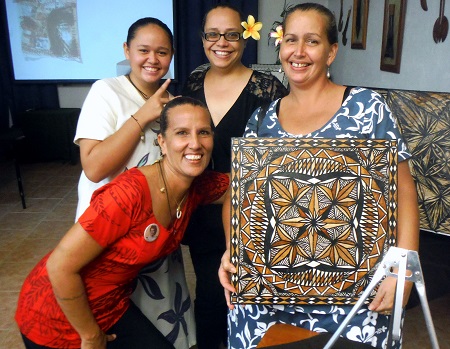
Artist Regina Meredith (front left) is seen here with Vicky Walker Manila (front right), during the Business and Professional Women of American Samoa's fundraising event this past weekend. In the background, (l-r) Rose Manila and Kathy Baker look on. (Photo: J. Kneubuhl)

Artist Regina Meredith (front left) is seen here with Vicky Walker Manila (front right), during the Business and Professional Women of American Samoa's fundraising event this past weekend. In the background, (l-r) Rose Manila and Kathy Baker look on. (Photo: J. Kneubuhl)
ASCC Artist Delivers Keynote Speech for International Women's Day
March 13, 2014
By James Kneubuhl, ASCC Press Officer
The Business and Professional Women (BPW) of American Samoa joined in the national and worldwide celebration of International Women’s Day this past Saturday with a fundraising event titled “International Women’s Day Art Show: Inspiring Change,” which featured as keynote speaker artist Regina Meredith of the American Samoa Community College (ASCC). “In keeping with this year’s theme, we chose Reg because of her talents as both an artist and a teacher and because of her work with her students and local artists to inspire change in art,” said local BPW President Anne Wellborn. “Her presentation on the siapo art form and the history of this traditionally female format beautifully showcased her knowledge of the history of art in American Samoa and her love and respect for women artists.”
The event not only helped inspire change, but also helped make a significant change in the circumstances of an ASCC student. Funds raised at the event went towards the BPW scholarship fund, the current recipient of which is Theresa Togia, an exemplary student who serves as President of the College’s Student Government Organization but who does not qualify for the financial aid options open to most students in American Samoa. The BPW scholarship will assist Ms. Togia, now in her second year at ASCC, through all four semesters of her pursuing her Associate of Arts degree.
As an instructor who familiarizes her students with siapo and other Samoan art forms through her ASCC class Indigenous Art (ART 161), Meredith strives to continue the passing-down of knowledge to new artists who will keep the craft alive and evolving. To illustrate how essential the handing-down process is in the realm of art, she began her talk by showing how the Renaissance, the re-awakening of interest in literature, philosophy, science and art, came about when the artists and intellectuals of the day looked to ancient Greece and Rome for inspiration. “Re-learning the knowledge of the ancients laid the ground work for the Renaissance thinkers and artists to move forward,” she explained. “To be founded in tradition enabled them to expand into newness.”
Meredith also noted how throughout the history of art, most of its great practitioners began as apprentices, and how innovations on their part only became possible after they mastered the fundamentals of their craft from studying under those who came before them. Paradoxically, anything new is by necessity grounded in something old. Siapo, she continued, has for been handed down in much the same way as art fundamentals during the Renaissance. “We began as apprentices under the teaching of a master,” Meredith recalled of herself and her peers. “We learned day after day and year after year as much as we could – looking at the u’a, scraping trees, making the dyes, cooking the masoa, wrapping our boards, and then learning the mamanu – the motifs to make our designs, something passed on since the beginning.”
As she spoke, Meredith stood surrounded by siapo mamanu works from four generations of artists, including pieces by her mentor and primary inspiration Mary Pritchard, Marilyn Pritchard Walker, Adeline Pritchard Jones, Maria Walker, Su’a Tupuola Wilson Fitiao, Nick King, Tupito Walker Gadalla, Marybeth Melcher Braun and herself. “These works convey a wealth of commitment, love, endurance and dedication,” said Meredith, “not just to the art form, but to a tradition and cultural heritage as well. Many of us have developed an individual style, but there is a degree of mindfulness that siapo has tradition. It hails from our ancestors, and its rich backbone to our Samoan history is reason enough to maintain it.”
“My hope for the future, for those who want to learn more about our art forms, namely siapo, is to first delve into the richness of its past,” she concluded. “Study it, and learn from others who have learned from others and so on. Be inspired by the tradition, know it like the back of your hand, live it, maintain it, and any change will emerge naturally.”
Following Meredith’s talk, the BPW held an auction of an original siapo work by Maria Walker, raising $300 towards the organization’s scholarship fund. The BPW scholarship is offered to female residents of American Samoa with a high school diploma or GED who have a financial need and are not eligible for the US Pell Grant. Applicants must agree to take a minimum of 12 credit hours per semester, maintain a cumulative GPA of 3.0 or higher, and work up to 10 hours per month as an intern for our organization. The scholarship pays registration fees, tuition and text books for two full years. The next scholarship will be available when current recipient Ms. Togia completes her program.
